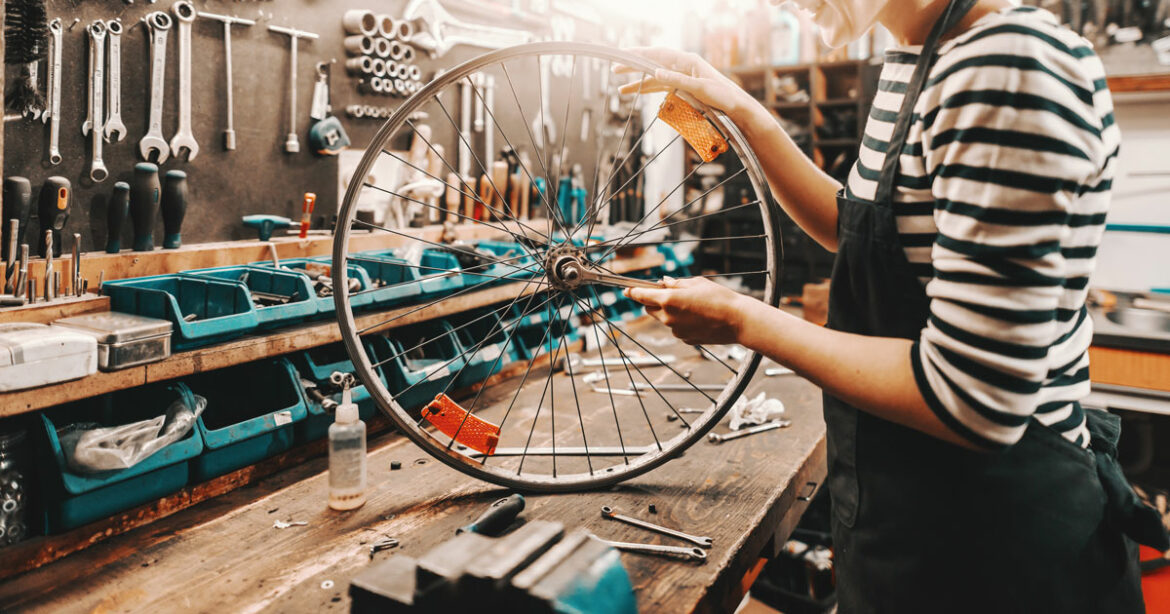Give unwanted or faulty goods a new lease of life by getting involved with Cambridge’s circular economy
Words by Alex Fice
These days, buying new or replacing broken items is easier than ever, with e-commerce giants offering enticing deals and handy next-day delivery options – all from the comfort of your sofa. But as demand for new products rises, so does the pressure on the planet’s precious resources. There’s no two ways about it: our current consumer habits are wrecking the world with waste.
The circular economy offers an alternative to the linear consumer model of buy, use, bin. Designed to eliminate waste and pollution by circulating products and materials through schemes such as repair cafes and gift economies, the circular economy is an important framework for changing behaviours in a way that promotes altruism and more sustainable consumer habits.
Cambridge has a wealth of initiatives inspired by the circular economy, run by groups such as Life is a gift, Transition Cambridge and Cambridge Carbon Footprint. We spoke to two of them to find out more.
Cambridge Carbon Footprint
Cambridge Carbon Footprint (CCF) supports people in Cambridgeshire to reduce their home energy use and consumerist habits, while promoting more sustainable modes of travel and climate-friendly diets. Each year, it runs or supports around 60 events, with the help of over 400 enthusiastic volunteers.
One of its main areas of work includes supporting over 30 individual repair cafes in the region. These help people prolong the life of household items, so they’re not thrown into waste disposal prematurely. CCF invites dozens of repairers – from electronics engineers to DIYers, jewellery menders and sewers – to lend their expertise for free. “Many of our fixers are retired senior engineers that love to keep using their skills and introduce visitors to repairing. They are passionate about saving the earth’s precious resources and keeping stuff out of landfill,” says Nicole Barton, volunteer and events co-ordinator at Cambridge Carbon Footprint.
Repair cafes also play an important role in restoring treasured family heirlooms, which might otherwise be left to collect dust in some forgotten nook of the house. At a recent repair cafe in Arbury, a woman was moved deeply to hear her childhood music box play again, after retrieving it from the attic following her mother’s passing. Another remarkable fix saw a vintage gramophone play a record for the first time in ten years. “Some repairs are very sentimental,” says Nicole. “It can be like TV’s The Repair Shop or the ‘Antiques Roadshow with tissues’ as we like to call it!”
Over the eight years CCF has supported repair cafes in Cambridgeshire, Nicole and her colleague Kate Boursnell have received consistently positive feedback from visitors. “We think it’s because a repair cafe is like a little utopia. You walk into a super-friendly community space, where a load of talented people are just waiting to help you out – not for payment or an ulterior motive, but just because they can,” says Nicole. “It’s a positive place, one that hints at the alluring possibility of a different future, one of mutual aid, community, reuse and cherishing what we have – rather than heading straight for the new, while creating yet more pollution. There’s always lots of chatter and homemade cake, too!”
Visit cambridgecarbonfootprint.org to find out when your next local repair cafe is taking place. Places are often booked well in advance, but there is usually space for drop-ins.
Life is a Gift
Life is a gift (LIAG) is a gift economy founded in 2011 on Facebook, with around 21,000 members in its Cambridgeshire groups. It was created to enable as many people as possible to gift items, skills and related information to one another. It is similar to the global organisation Freecycle, except it is more personal, with an open community feel.
Unlike some circular economy models, LIAG does not permit the exchange of money; inspired by different gift economies, it allows members to make offers and requests for gifts, encouraging generosity and for people to feel comfortable with asking for what they want in a non-judgemental atmosphere. “Life is a gift is one of the most direct examples of a circular economy, because item transfer is not impeded by lack of money, so things can happen very quickly for anyone able to collect an item (or have it delivered),” explains co-founder Nick Stibbs. “It keeps items out of landfill, encourages decluttering of living and storage spaces, and saves on production and transport costs in the wider economy, freeing people’s money to use for other things. It also reduces reliance on government and NGO grants for household items.”
Not only does LIAG reduce waste, but it also strengthens bonds in the local community. During the pandemic, it served as a means of connecting people when self-isolation rules made it difficult to fetch provisions. “I reached out in December of 2020 after having just had a baby,” says LIAG member Hannah. “Our family was hit by Covid-19 and my partner was very unwell, leaving me ill, trapped in the house and looking after a baby, with two other children. Without Life is a gift, we would have had no presents, food, or any kind of Christmas, but with all the wonderful generosity, visits and gifts from strangers, we were truly blessed!” More recently, Life is a gift has responded to the Ukraine crisis: “A lovely Polish lady was collecting dog food for Ukraine,” shares Celine. “I, and others, donated – she let us know when it was on its way.”
The resourceful methods in which members have used the group demonstrates that these initiatives do much more than reduce waste; they provide a life-giving source of community.
Join Life is a gift on Facebook by searching for Life is a gift + your electoral ward or local area, eg Cambridge City, Arbury, St Ives/Huntingdon. To discover all Life is a gift groups, search for the page Lifeisagift

